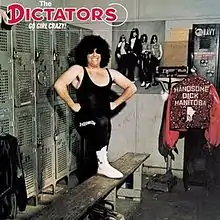Go Girl Crazy!
Go Girl Crazy! is the debut album by American punk rock band The Dictators. It was released on March 1975 and is considered one of the first examples of punk rock.[1][2][3]
| Go Girl Crazy! | ||||
|---|---|---|---|---|
 Cover photo by David Gahr | ||||
| Studio album by | ||||
| Released | March 1975 | |||
| Recorded | 1975 | |||
| Studio | CBS Studios, New York City | |||
| Genre | Protopunk, punk rock | |||
| Length | 34:48 | |||
| Label | Epic Au Go Go (1989 Australian release) | |||
| Producer | Murray Krugman, Sandy Pearlman | |||
| The Dictators chronology | ||||
| ||||
Response
Critical reception
| Review scores | |
|---|---|
| Source | Rating |
| AllMusic | |
| Christgau's Record Guide | B+[5] |
| Collector's Guide to Heavy Metal | 9/10[6] |
| Entertainment Weekly | A[7] |
| Record Collector | |
| The Rolling Stone Album Guide | |
Go Girl Crazy! has been well-received critically and is considered a precursor to punk rock. In its retrospective review, AllMusic notes that while the album was confusing to audiences at the time of its release, it became inspirational for dozens of groups to follow.[4] Trouser Press enthused that the band deserves "scads of credit" for "blazing a long trail, melding the essentials of junk culture... with loud/hard/fast rock'n'roll and thus creating an archetype".[10] According to a 2001 article in The Village Voice, the album's "blueprint for bad taste, humor, and defiance" has been replicated in the work of such bands as the Ramones and Beastie Boys.[11]
Trouser Press lauded the album as a "wickedly funny, brilliantly played and hopelessly naïve masterpiece of self-indulgent smartass rock'n'roll".[10] Entertainment Weekly wrote: "Go Girl Crazy's junk-generation culture and smart-aleck sensibility did provide an essential blueprint for '70s punk. With its TV references and homely vocals, this ground-breaking and long-unavailable album continues to inspire underground groups everywhere."[7] Canadian journalist Martin Popoff enjoyed the album and considered the Dictators "more obviously comedians than musicians", "with a sense of self-deprecating humor poking sticks at the seriousness of heavy metal".[6]
Influence
In addition to musicians, the album was also one of two factors influencing the creation of Punk magazine by John Holmstrom and music journalist Legs McNeil. In Please Kill Me: The Uncensored Oral History of Punk, McNeil said that the album so resonated with him and his friends that they started the magazine strictly so they could "hang out with the Dictators".[12]
Track listing
All tracks are written by Andy Shernoff, except where noted.
| No. | Title | Writer(s) | Length |
|---|---|---|---|
| 1. | "The Next Big Thing" | 4:20 | |
| 2. | "I Got You Babe" (Sonny & Cher cover) | Sonny Bono | 4:08 |
| 3. | "Back to Africa" | 3:35 | |
| 4. | "Master Race Rock" | 4:13 |
| No. | Title | Writer(s) | Length |
|---|---|---|---|
| 5. | "Teengenerate" | 3:24 | |
| 6. | "California Sun" (Joe Jones cover) | Henry Glover, Morris Levy | 3:04 |
| 7. | "Two Tub Man" | 4:08 | |
| 8. | "Weekend" | 4:00 | |
| 9. | "(I Live For) Cars and Girls" | 3:56 |
Personnel
- The Dictators
- Andy Shernoff – lead and backing vocals, bass guitar
- Ross "The Boss" Funichello – lead guitar, backing vocals
- Scott Kempner – rhythm guitar
- Stu Boy King – drums, percussion
- Additional musicians
- Handsome Dick Manitoba – additional lead vocals (Credited solely as "Secret Weapon")
- Allen Lanier (credited as Alan Glover) – keyboards on "Teengenerate" and "Cars and Girls"
- Production
- Murray Krugman, Sandy Pearlman – producers
- Tim Geelan, Lou Waxman – engineers
- Ed Sprigg – mixing at the Record Plant, New York City and Kiel Auditorium, St. Louis
- Howie Lindeman, Stan "Corky" Stasiak – tape operators
- Greg Calbi – mastering at The Cutting Room, New York City
- David Gahr – front cover photography
References
- Rombes, Nicholas (2009). A Cultural Dictionary of Punk: 1974–1982. Continuum International Publishing Group. p. 20. ISBN 978-0826427793.
- Waksman, Steve (2009). This Ain't the Summer of Love: Conflict and Crossover in Heavy Metal and Punk. University of California Press. p. 119. ISBN 978-0-520-25310-0.
- Wolf, Mary Montgomery (2007). "We accept you, one of us?": Punk rock, community, and individualism in an uncertain era, 1974--1985. p. 317. ISBN 9780549325819.
- Deming, Mark. "Go Girl Crazy! – The Dictators". AllMusic. Retrieved February 21, 2012.
- Christgau, Robert (1981). "D". Christgau's Record Guide: Rock Albums of the Seventies. Ticknor and Fields. ISBN 0-89919-026-X. Retrieved February 24, 2019 – via robertchristgau.com.
- Popoff, Martin (2003). The Collector's Guide to Heavy Metal – Volume 1: The Seventies. Collector's Guide Publishing. p. 90. ISBN 978-1894959025.
- Robbins, Ira (February 22, 1991). "Go Girl Crazy". Entertainment Weekly. No. 52. Retrieved September 19, 2020.
- Needs, Kris (August 2013). "The Dictators – Go Girl Crazy!". Record Collector. No. 417. Retrieved September 19, 2020.
- Catucci, Nick (2004). "The Dictators". In Brackett, Nathan; Hoard, Christian (eds.). The New Rolling Stone Album Guide (4th ed.). Simon & Schuster. p. 234. ISBN 0-7432-0169-8.
- Robbins, Ira. "Dictators". Trouser Press. Retrieved February 21, 2012.
- Lefelt, Jack (October 9, 2001). "Manifest Destiny". The Village Voice. Retrieved September 19, 2020.
- Holmstrom, John; McNeil, Legs (2006). Please Kill Me: The Uncensored Oral History of Punk (10th anniversary ed.). Grove Press. p. 286. ISBN 0-8021-4264-8.
Further reading
- Olliver, Alex (September 20, 2017). "The New York punk albums you need in your record collection". Louder.
External links
- Go Girl Crazy! at Discogs (list of releases)